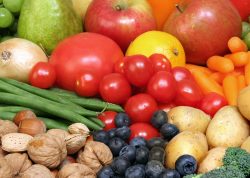 Consuming a hot dog could actually cost a person 36 minutes of living a healthy life, while consuming a handful of nuts could help a person gain 26 minutes of an extra healthier life. A study looked at more than 5,800 foods and ranked them by the nutritional disease that can burden humans by their consumption and also the impact they make on our environment.
Consuming a hot dog could actually cost a person 36 minutes of living a healthy life, while consuming a handful of nuts could help a person gain 26 minutes of an extra healthier life. A study looked at more than 5,800 foods and ranked them by the nutritional disease that can burden humans by their consumption and also the impact they make on our environment.
The study discovered that 10% of a daily caloric consumption from processed meat and beef to a mix of nuts, vegetables, fruits, select seafood and legumes could possibly reduce a person’s dietary carbon footprint by up to 1/3 and help people gain healthy minutes of 48 per day.
Generally speaking, diet recommendations lack actionable and specific direction to help motivate people to think about changing their behavior and rarely do these recommendations even address their impact on the environment.
The study was built on a new epidemiology based index of nutrition (HENI) which the team devised in collaboration with nutritionist from Nutrition Impact and LLC. HENI calculates the net detrimental or beneficial burden of health in just minutes of a healthy life linked with a serving of a particular food that has been consumed.
The index was adapted from the Global Burden of Disease. This adaptation looks at disease morbidity and mortality linked to a single food a person chooses. The team used risk factors of 15 disease burdens and disease estimates and then combined the results with the nutritional profiles of foods that are eaten in the U.S. based on the database in What We Eat in America by the National Health and Nutrition Examination Survey. Foods that showed positive scores add minutes of healthy life while those foods that showed negative scores are linked to outcomes of health that are harmful.
In order to evaluate food impact on the environment, the team utilized IMPACT World+, a method that assesses the impact of food’s life cycle (processing, production, preparation, cooking manufacturing, waste and consumption). They added water use improved assessments and health damages to humans from the fine particulate matter formation. They then gave scores for environmental indications in a group of 18 keeping account for detailed food recipes and also anticipated waste food.
They then grouped the foods into three zones of color – green, yellow and red based on their combined environmental and nutritional performances.
The green zone showed foods that are recommended in order to increase a person’s diet and includes foods that have a low impact on the environment and are beneficial nutritionally. These are foods such as legumes, nuts, vegetables grown in the field, whole grains, nuts, fruits and some seafood.
The Red zone included food that has either substantial impact on the environment or nutrition and should definitely be decreased or even avoided in a person’s diet. These were foods such as processed meats and were driven by environmental or climate impacts such as beef and pork.
The team does acknowledge that their range for all indicators varies considerably and also say that food that are beneficially healthy may not always show the lowest environmental impact and vice versa.
Earlier studies have very often lessened the findings to an animal based vs. plant based food discussions. The team finds that foods that are plant based typically do perform greater but there are a lot of variations within foods that are animal based and foods that are plant based.
From their findings, the team recommends:
Decrease consumption of food that have the most negative effect on the environment and health which includes highly processed meats, shrimp, beef, lamb, pork and vegetables grown in greenhouses.
Increase consuming foods that are nutritionally beneficial such as fruits and vegetables grown in fields, nuts, legumes and seafood that has a low impact on the environment.
The team’s findings show that even small substitutions can offer a powerful and feasible strategy for achieving substantial environmental and health benefits and do so without requiring considerable shifts in diet.
To view the original scientific study click below:
Small targeted dietary changes can yield substantial gains for human and environmental health





